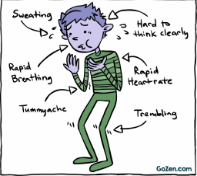How to Cure Test Anxiety

November 10, 2016
Many students today experience what is known as test anxiety or test stress. In fact, 16-20% of students have high test anxiety while another 18% have moderately high test anxiety. This means that over 10 million students in North America alone experience this type of stress.
According to sas.calpoly.edu, Test anxiety makes you feel agitated or distressed, it can be physical or mental, such as feelings of ‘butterflies in your stomach,’ an instant headache, or sweaty palms before or during an exam. It is normal to feel some anxiety before a test, but having too much test anxiety can lead to serious academic impairment, poor morale, and an unwillingness to do work efficiently or correctly.
There are three types of symptoms of test anxiety; physiological, which can cause rapid heartbeat, knots in one’s stomach, headache, tension, and profuse perspiration; behavioral, which causes indecisiveness about an answer, “going blank”, and an inability to organize one’s thoughts; there is also Psychological – feelings of nervousness, restlessness, or continual doubt.
“Test anxiety has many sources; most commonly it is caused by a lack of exam preparation. Cramming the night before the exam, poor study habits, poor time management, lack of organization of text, notes, and homework are examples of being unprepared. Test anxiety can also be caused by worrying about past test performance, how others are doing on the test and the consequences if you don’t do your best. These feelings may intensify if you are already on academic probation” according to sas.calpoly.edu. Understanding where your test anxiety comes from is an important way of beginning to overcome it.
I spoke to 10 students on whether or not they believe they have test anxiety, half said yes, and the other half said that they have some anxiety before quizzes and tests, but not as much as others. No one I had asked had said that they experience no stress or anxiety before exams. This shows that testing causes stress for everyone, and no student feels 100% confident in themselves or their abilities when it comes to these tests.
Fortunately, there are also ways to help reduce test anxiety and stress. One way you may be able to do this is by following sas.calpoly.edu’s list of ways to help reduce test anxiety.
What To Do At Least a Week Before the Exam
- Give yourself enough time to review the material – start at least a week early.
- Ask your professor what the format of the test will be: multiple choice, essay, fill in the blank, true or false, etc.
- Ask your professor questions such as: How long will the test be (amount of questions)? Is there a time limit? Will there be a study guide? Will there be a review session?
- Make a list of the topic/chapters/materials that will be on the exam. Write down any formulas, definitions or key facts that you need to know. Look for these in your lecture notes, textbooks, sample tests, quizzes, and handouts.
- If it helps you, make flash cards, outlines, drawings, etc. that will help you learn and remember the material. Visual aids such as these can help during the test.
- Pay attention to the areas your professor spends a lot of time on in class. If your professor spent two weeks emphasizing a subject, then assume it will be on the exam. Ask your professor if out of class reading material will be included on the test.
- DO NOT PROCRASTINATE. Don’t worry about the amount of material you need to know: that’s wasting time. Instead, start studying! Give each topic enough review time and spend the most time on subjects emphasized by the professor.
- Test yourself on the material. As you write problems on the board, talk out loud about what you are doing. (Give the lecture!) If you can talk and write about it, you know it.
- The night before the exam, gather any materials that you might need: pencil, pen, calculator, scantron, etc. Then, get a good night’s sleep.
- Avoid cramming. Cramming requires a great deal of energy, contributes to stress and tension, and does not last. Cramming is one of the reasons you may “blank out.”
- Eat a healthy breakfast. Some foods that are recommended to reduce stress include fresh fruits and vegetables. In general, high carbohydrate foods won’t sustain you while proteins will. Figure out what’s best for you to eat in the mornings.
- Be on time. Start out early, get a good parking spot, walk relaxed; slow things down.
- Don’t talk to other students before the exam because you might just get confused. Other students may be suffering from test anxiety and they can make you feel anxious if they start asking you questions. Remember: it’s a solo experience.
And after all, “The mind is a powerful tool that may work either for you or against you. Test anxiety can be controlled with an attitude adjustment. Visualizing success can take you a long way. If you tell yourself you can’t succeed, then you won’t. If you tell yourself you can succeed and do well, you will.”
